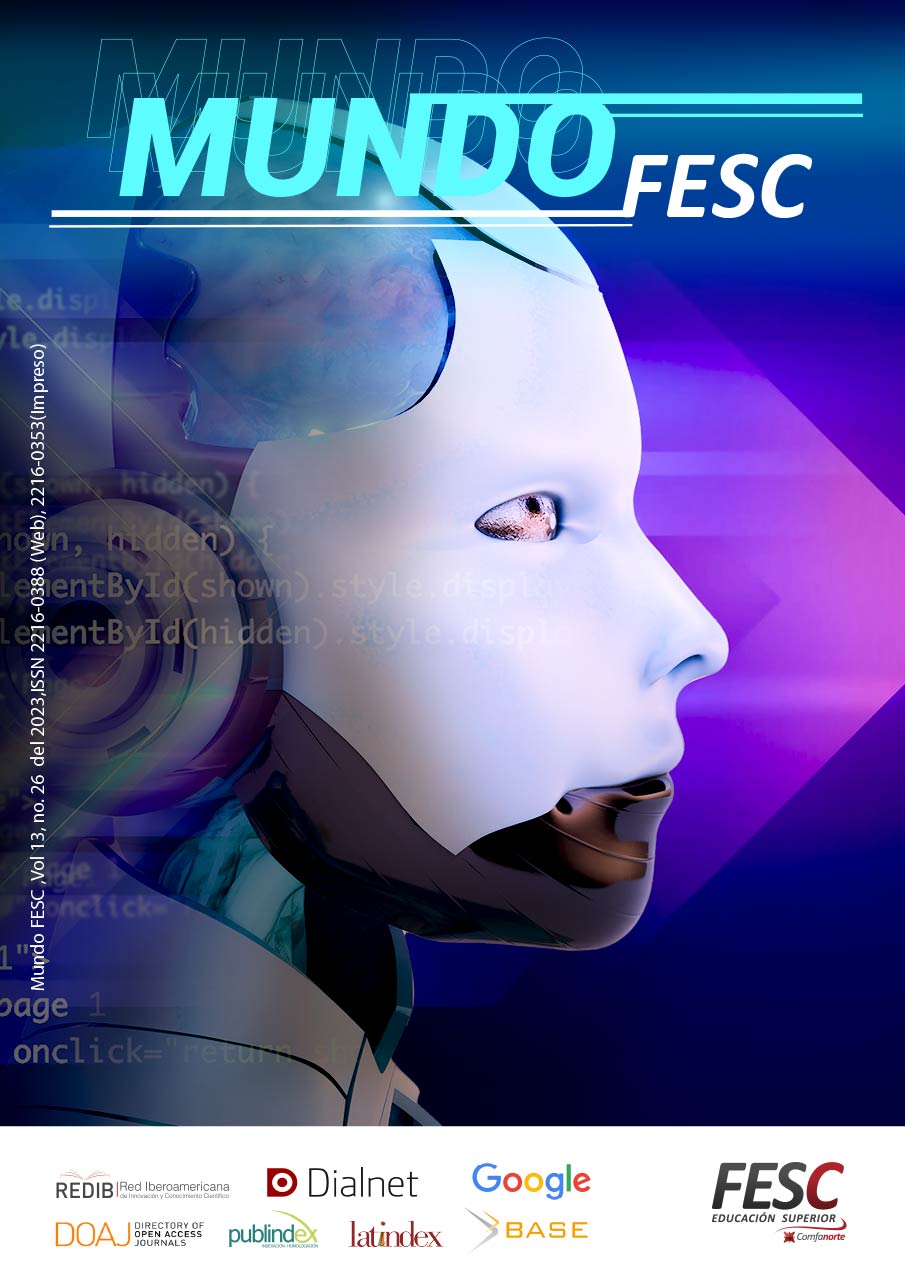Instrumento para identificar competencias pedagógicas de los docentes profesionales de la Contaduría Pública
DOI:
https://doi.org/10.61799/2216-0388.1519Palabras clave:
Prácticas pedagógicas, Contador Público, Competencias, instrumento de investigaciónResumen
Compartir la experiencia adquirida en la creación del instrumento de investigación en el proyecto titulado Competencias pedagógicas del Contador Público que orienta cursos en el programa de Contaduría Pública es el principal objetivo en este artículo. Se da conocer la importancia de la investigación teniendo en cuenta que la formación del profesional en contaduría pública es muy importante dada la relevancia del contador público en las empresas quien es garante y da fe pública indicando cual es la situación real en aspectos financieros, por tal razón se desprende la responsabilidad de las universidades de tener docentes con conocimientos que constantemente se esté capacitando en su área profesional y que posea las herramientas necesarias para que pueda realizar las practicas pedagógicas de una manera idónea. En el desarrollo del artículo se menciona algunos antecedentes literarios junto a los teóricos que respaldan la investigación. Se da a conocer el objetivo y el respectivo problema de investigación, se demuestra el tipo de investigación cualitativo- descriptivo para poder recopilar y analizar la información, conociendo las metodologías impartidas en los encuentros pedagógicos. Así también se demuestra los participantes que se van a tener en cuenta en la investigación y por último se da a conocer la manera como se realizaron los instrumentos de investigación. En síntesis, el artículo “Instrumento para identificar competencias pedagógicas de los docentes profesionales de la Contaduría Pública” describe el proceso llevado a cabo para crear tanto la entrevista semiestructurada, dirigida a los docentes, como del instrumento aplicado a los estudiantes en el grupo focal.
Descargas
Referencias
[1] S. Tobón, Formación integral por competencias. Bogotá: ECOE, pág. 23, 2013
[2] UFPS, Proyecto Educativo Institucional. Universidad Francisco de Paula Santander Cúcuta, p.10, 2021
[3] V. A. Villarroel y D. V. Bruna, Competencias pedagógicas que caracterizan a un Docente Universitario de Excelencia: Un estudio de caso que incorpora la perspectiva de docentes y estudiantes. Concepción – Chile, 2017 DOI: https://doi.org/10.4067/S0718-50062017000400008
[4] E. M. Rivadeneira Rodríguez, “Competencias didácticas-pedagógicas del docente, en la transformación del estudiante Universitario”, Revista Científica Ciencias Humanas, vol. 13, no. 37, pp. 41-55, julio, 2017
[5] P. A. Ogaz Diaz, Competencias pedagógicas en educación superior técnico profesional: relación con los indicadores académicos en docentes especialistas sin formación inicial en pedagogía, trabajo de grado, PONTIFICIA UNIVERSIDAD CATÓLICA DE CHILE, Santiago de Chile, Chile, 2019
[6] O. E. Carvajal Labastida, Modelo de investigación formativa para el programa de Contaduría Pública de la Universidad Libre seccional Cúcuta, trabajo de grado, Universidad Libre, Cúcuta, Colombia, 2016
[7] C. L. Guzmán Varón, Desarrollo de competencias tecnológicas y pedagógicas en los docentes, incorporando las TIC a los procesos de aprendizaje en el Colegio Reino de Holanda, trabajo de grado, UNIVERSIDAD DE LA SABANA, Bogotá, Colombia, 2016
[8] W. Rojas Rojas, Asimilación y rupturas de la educación de la Contaduría Pública: desde el sur y para el sur, 2017 DOI: https://doi.org/10.17533/udea.rc.332822
[9] A. I Montilla, Consideraciones sobre las estrategias de enseñanza más efectivas en la contabilidad, 2016
[10] J. De Zubiría Samper, ¿Qué son las competencias? México, 2006
[11] X. Vargas Beal, ¿Cómo hacer investigación cualitativa? Una guía práctica para saber que es la investigación en general y como haberla, con énfasis en las etapas de la investigación cualitativa. México: EXETA, 2007
[12] G. P Guevara Alban, A. E Verdesoto Arguello y N. E. Castro Molina, “Metodologías de investigación educativa (descriptivas, experimentales, participativas y de investigación-acción)”, Revista científica mundo de la investigación y el conocimiento, pp. 166- 167, 2020 DOI: https://doi.org/10.26820/recimundo/4.(3).julio.2020.163-173
[13] C. Ortega, “5 instrumentos para recopilar información”, QuestionPro. 2023. [En línea]. Disponible en: https://www.questionpro.com/blog/es/instrumentos-para-recopilar-informacion/
[14] V. Martínez Godoy, Métodos, técnicas e instrumentos de investigación. 2013. [En línea]. Disponible en: https://d1wqtxts1xzle7.cloudfront.net/36745474/Metodos tecnicaseinstrumentosdeinvestigacion1-libre.pdf?1424739366=&response-content- disposition=inline%3B+filename%3DMetodostecnicaseinstrumentosdeinves.pdf&Exp ires=1700084900&Signature=KwEx3fJad
[15] M. Rodríguez Calvente y I. Rodríguez, El grupo focal como técnica de investigación cualitativa en salud: diseño y puesta en práctica. 2000. [En línea]. Disponible en: http://www.unidaddocentemfyclaspalmas.org.es/resources/5+Aten+Primaria+2000.+Grupo+ Focal+Dise$C3$B1o+y+Practica.pdf DOI: https://doi.org/10.1016/S0212-6567(00)78485-X
[16] A. Hamui-Sutton, y M. Varela Ruiz, “La técnica de grupos focales”, Investigación educ. médica, vol. 2, no. 5, pp. 55-60, 2013 DOI: https://doi.org/10.1016/S2007-5057(13)72683-8
[17] L. A. Galicia Alarcón, J. A. Balderrama Trápaga y R. Edel Navarro, “Validez de contenido por juicio de expertos: propuesta de una herramienta virtual”, Apertura (Guadalajara, Jal.), vol. 9, no. 2, pp. 42-53, 2017. Doi: 10.32870/ap.v9n2.993 DOI: https://doi.org/10.32870/Ap.v9n2.993
[18] P. Folguerias Bertomeu, Técnica de recogida de información: La entrevista. 2016. [En línea]. Disponible en: https://diposit.ub.edu/dspace/handle/2445/99003?mode=full
[19] M. Buss Thofehrn, M. J. López Montesinos, A. Rutz Porto, S. Coelho Amestoy, I.C. Oliveira Arrieira, M. Mikla, Marzena, “Grupo focal: una técnica de recogida de datos en investigaciones cualitativas”, Index de Enfermería, vol. 22, no. 1-2, pp. 75-78, 2013. Doi: 10.4321/S1132-12962013000100016 DOI: https://doi.org/10.4321/S1132-12962013000100016
[20] A. M. Izquierdo Morán, L. K. Álvarez Gómez, L. K. Baque Villanueva y D. A. Viteri Intriago, “Estrategias pedagógicas en el desarrollo de competencias académicas en docentes universitarios”, Conrado, vol. 17, no. 81, pp. 196-202, 2021
[21] F. Cisterna Cabrera, “Categorización y triangulación como procesos de validación del conocimiento en investigación cualitativa”, Theoria, vol. 14, no. 1, pp. 61-71, 2005
[22] V. Jiménez Chavez, “Triangulación metodológica cualitativa y cuantitativa”, Revista sobre estudios e investigaciones del saber académico (Encarnación), vol. 14, pp. 76-81, 2021 DOI: https://doi.org/10.70833/rseisa14item276
Descargas
Publicado
Número
Sección
Licencia
Derechos de autor 2023 Mundo FESC

Esta obra está bajo una licencia internacional Creative Commons Atribución-NoComercial 4.0.






